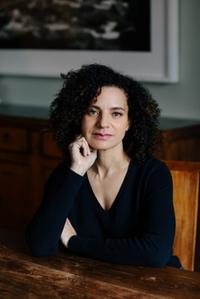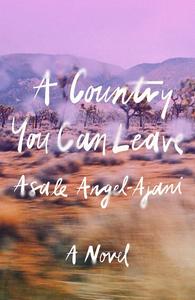
|
|
| photo: Sylvie Rosokoff | |
Asale Angel-Ajani is the author of a nonfiction book, Strange Trade, about drug traffickers imprisoned in Italy, and is a professor at the City College of New York (CUNY) where she serves as director of the Women's and Gender Studies Program. Her first novel, A Country You Can Leave (MCD/Farrar, Straus and Giroux, $27), follows the turbulent relationship of a biracial Black teen and her ferocious Russian mother, struggling to survive in the California desert. Angel-Ajani lives, writes and works in New York City.
Handsell readers your book in 25 words or less:
A Country You Can Leave is about a mother--a Russian immigrant--and her biracial Black daughter living on the edge of society, trying to find love and acceptance.
On your nightstand now:
I can no longer keep books on my nightstand. It was too much pressure. Really. The books on my nightstand became like a chorus of nagging aunties whenever I added a new friend to the pile, leaving my old friends unfinished. So I now carry my books around with me everywhere. I have three with me now.
Wanda Coleman's The Riot Inside Me is a collection of essays and some poetry, and I am being transported back in time reading about her perspective as a Black woman in California in the 1970s. She has some very pointed writing about success and being on the margins of the Black literati of the '70s and '80s especially.
The Hour of the Star by Clarice Lispector is a gorgeous slim novel that will likely make my all-time greatest list. For me, it's a writer's novel and completely untethered to the demands of anything outside of the story. It's not as free form as some of her other work, but it feels more visceral. I find myself reading and rereading lines and saying, "Damn" out loud nearly every time.
I am also reading the reprint of Claudia Tate's Black Women Writers at Work, a collection of in-depth and smart interviews with Black women writers like Toni Cade Bambara, Alexis De Veaux and Gayl Jones, among others. Since I am writing another book right now, I like to read this when I take a break. Sometimes the interviews are like eavesdropping on a conversation happening at the kitchen table, other times the interviews are master classes in the role of the novel in Black liberation movements.
Favorite book when you were a child:
My mother was an enormous reader, so I was a kid who grew up in the library. Of course, inevitably, we would accumulate too many late fees, so we would buy books from yard or garage sales. I bought my first book in a series--the whole set--for 25 cents at the Rose Bowl Swap Meet. It was The Adventures of the Great Brain by John Dennis Fitzgerald. I loved that this kid, Tom, was always scheming and dreaming up some plan to make money or get something for free but he was kind, too. I was really into it. I didn't know it at the time, but the book probably spoke to me because though demographically, I was not a young white settler boy living in rural Utah during the mid 1800s, the book dealt with being a minority and having to confront injustice in a very closed community.
Your top five authors:
James Baldwin, Anna Akhmatova, Gayl Jones, Louise Erdrich, Toni Morrison. This is a rotating list, of course.
Book you've faked reading:
I'm a public reader. Subway. Buses. Airplanes. Restaurants. I am not ashamed to admit that I have faked reading many a book with complicated or otherwise seductive titles, it's kind of a birthright, given my graduate degrees. Without question I have faked reading anything by Jean Baudrillard, and Proust's In Search of Lost Time. I've also been thumbing my way through the 700 pages of Being and Nothingness by Jean-Paul Sartre for a couple of decades.
 Book you're an evangelist for:
Book you're an evangelist for:
I have two books that I swoon and cry over to anyone who will listen. The first is Loukoum: The "Little Prince" of Belleville by Calixthe Beyala, translated by Marjolijn de Jager. It's a story about a seven-year-old Malian boy living in a Paris banlieue with his father and his two wives. It's a slim book, beautifully written, about class, race and male privilege in an immigrant community.
The second book is The Last Report on the Miracles at Little No Horse by Louise Erdrich. It is the perfect kind of book. It's gripping and original and tinged with a bit of mystery and a bit of a love story.
Book you've bought for the cover:
Too many books were bought for the cover. See my nightstand.
But also, many of the books I bought because they looked beautiful also thwart the negative connotation about "buying books" based on the cover. A book I bought based on a beautiful cover that was also very good and totally engrossing was Xochitl Gonzalez's novel Olga Dies Dreaming.
Book you hid from your parents:
I think I hid a lot of books from my mother, mostly, because any new book I got, my mother read first. She said it was because she wanted to see if they were appropriate, but I think it was because my mother would just tear through books when she wasn't working. She was always looking for something new to read. So, mostly, I hid books so that I could have the pleasure of reading them first. There were a few books that she censored though--Deenie by Judy Blume, another flea market find, and some book that I found in the literal gutter outside of my elementary school. I can't remember the title and that is likely because my twin sister and I (upon seeing how graphic and smutty the book was) decided to make a book jacket for it out of construction paper. We thought we weren't being obvious at all.
Book that changed your life:
I was given a seventh grade reading assignment and we had to pick a book off a long list to read and write about. I brought the list to my mother because she had huge stacks of books around the house, mostly from the bargain bins and yard sales, and a few (strategically) never returned books from the local library. My mother pointed to the list, saying she had a copy of Wuthering Heights in her room. She even let me go in to get it. This was a huge deal. My mother's room was off limits. I found the book, started reading it and was bored. Then I saw a Black woman on the cover of a book. I picked it up and began reading I Know Why the Caged Bird Sings by Maya Angelou. Even now, when I think about that book, I get emotional. The clearest memory of my life was the day I found that book. It was the first time I felt a small piece of understanding myself. Up to that point, I had not read anything that, though different, resembled my upbringing as a Black girl in rural California.
Favorite line from a book:
"Who hasn't ever wondered: am I a monster or is this what it means to be a person?" --from The Hour of the Star by Clarice Lispector
"Ci sono notti/ che non/ accadono mai." --Alda Merini, Selected Poems. [There are nights that never happen]
Five books you'll never part with:
Eva's Man by Gayl Jones
In the Vortex of the Cyclone, Selected Poems by Excilia Saldaña, translated by Flora González Mandri and Rosamond Rosenmeier
The Bone People by Keri Hulme
The True Confessions of an Albino Terrorist by Breyten Breytenbach
The Master and Margarita by Mikhail Bulgakov
Book you most want to read again for the first time:
It's hard to choose one book, but maybe Their Eyes Were Watching God by Zora Neale Hurston or Sula by Toni Morrison.

